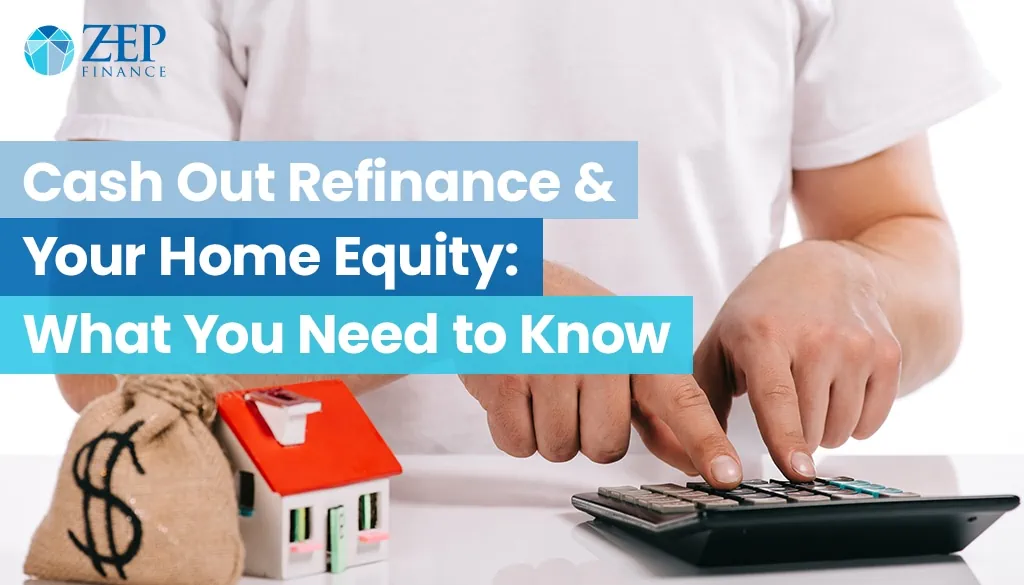Cash Out Refinance and Your Home Equity: What You Need to Know
Owning a home is a significant milestone in any person’s life. It’s important to realise, however, that your property can be more than just a place to live. It holds a hidden asset known as home equity, which can provide financial opportunities, such as a cash out refinance, when the need arises.
What is a cash-out refinance and when can homeowners tap into it? What is the relationship between this type of refinance and your home equity? Is this the only option available to homeowners?In this article, we will delve into the world of cash-out refinancing, its correlation with home equity, and the crucial factors to consider before you can refinance. We will also outline the other options you have and why a cash out refi may be better for you than these alternatives.
Understanding Home Equity
Before we discuss what a cash-out refinance is, let’s first discuss home equity. What is home equity and how does one gain equity on a property they own?
Home equity is essentially the difference between your property’s current market value and the outstanding balance on your mortgage. It’s an important indicator of your ownership stake in your home and can be a valuable financial resource. The calculation is simple: if your home is worth $300,000 and you owe $200,000 on your mortgage, your home equity is $100,000.
Or to put it plainly: Property Market Value – Outstanding Home Loan = Your Equity in Property
Now, several factors influence home equity. Property value fluctuations, improvements or renovations made to the home, and market trends all play a role. If the value of your property decreases, your equity will decrease too. If you make mortgage payments over time, your equity will also increase as you pay down your mortgage.
Home improvements can also impact your equity in a property. For example, if you renovate your home and increase its value, your equity will increase too. However, some home improvements may not necessarily increase your property value, so it’s important to do your research before investing in any significant changes.
Recognising the true value of your home equity is the first step in understanding how it can work for you.
Exploring Cash Out Refinance
Now, let’s tackle the question of what is a cash-out refinance and what it can mean to you?
What is a Cash Out Refinance?
Cash-out refinance is a type of mortgage refinancing option that enables homeowners to access the equity they’ve built up in their property. The process involves replacing an existing mortgage with a new one for an amount that exceeds the current outstanding balance. The difference between the new loan amount and the old mortgage balance is then disbursed to the homeowner in the form of a lump sum payment.
The released cash in a cash out refi can be used for various purposes. These include home improvements, debt consolidation, education expenses, and investments as well as anything else you can use cash for. This might also lead to lower monthly payments due to the possibility of securing a more favourable interest rate.
Consolidating high-interest debts, like credit card debt, into a single mortgage payment can potentially save you money in the long run. There’s also the potential for tax deductibility on mortgage interest payments, depending on local tax regulations.
However, it’s important to understand that this also comes with risks. Increasing your loan amount could lead to higher monthly payments depending on the total mortgage amount and potentially extend the overall mortgage term. You should also be aware that the real estate market’s volatility could impact your property’s value and the success of your refinance plan.
The Relationship between Cash-Out Refinance and Home Equity

Now, there is a reason why some people call this type of refinance an equity refinance, and that’s because your home equity plays a big part in it. You see, your home equity serves as the foundation for the cash-out refinance process.
The amount of equity a homeowner has in their property directly influences how much they can borrow through this refinance. The released funds are determined by the difference between the new loan amount and the outstanding mortgage balance. This is essentially the homeowner’s equity. So, the more home equity a homeowner has, the greater their potential to access substantial amounts of cash through a cash-out refinance.You should be aware that home equity also plays a crucial role in determining the Loan to Value Ratio (LVR) of the new mortgage. Your LVR ratio, which compares the loan amount to your property’s value, plays a significant role in how much you can cash out.
Cash Out Refinance Vs Alternative Options
When considering cash-out refinance, it’s essential to weigh it against alternative options. Home equity loans offer alternatives for accessing your home equity. Here are the differences between a home equity loan and a cash out refi:
Cash Out Refinance vs Home Equity Loan
Cash-Out Refinance
- Replaces your current mortgage with a larger loan, resulting in a single mortgage with an agreed interest rate (either fixed or variable) and repayment term.
- Regular repayments that can include both principal and interest.
- Provides a lump sum of funds at once, making it suitable for larger expenses.
- Involves settlement fees similar to those of a regular mortgage refinance.
Home Equity Loan
- Separate loan in addition to your existing mortgage, creating two distinct loans with fixed repayment terms.
- Usually comes with a fixed interest rate, ensuring stability in monthly payments.
- Separate monthly payment in addition to your original mortgage payment.
- Provides a lump sum as well, but it can be better suited for targeted projects or needs.
- Comes with a shorter term, which may result in higher monthly payments but less interest paid in the long run.
- May carry hefty settlement and processing fees, depending on the lender.
As you can see, these options come with pros and cons, but only a cash-out refinance offers the most benefits. You don’t have to pay two loans at the same time, can get a lump sum at settlement, and often involves very minimal settlement fees. So, when it comes to comparing cash out refinance vs vs home equity loan, you can easily see which option comes out on top.
How Much Equity Do I Need to Refinance?

In general, lenders prefer borrowers to have at least 20% equity in their home when refinancing. This means that you would need to owe less than 80% of the home’s current value.
However, some lenders may offer refinancing options to borrowers with less than 20% equity, but they may require you to pay for a lender’s mortgage insurance (LMI). LMI is an additional cost on top of your mortgage payment and is designed to protect the lender in case you default on your loan.
Should you opt for cash out refinancing now?
So, should you think about refinancing right now? With the Reserve Bank of Australia (RBA) increasing the cash rate multiple times since May 2022 (from 0.10% to 4.1% at the time of this writing), variable-interest rate mortgage holders are likely feeling the pinch.
If you find yourself paying upwards of $2000 or more on your monthly repayments and have some equity in your home that you can tap into, a refinance might be a good idea.
Is a Cash Out Refinance the Right Option for You?
Cash-out refinancing is a powerful financial tool that allows homeowners to leverage their property’s equity for a range of purposes. The relationship between cash-out refinance and home equity underscore the importance of the latter.
To make informed financial decisions about your refinancing options, it’s best if you talk with a professional mortgage broker who can outline the pros and cons of all your options and who can give you the right advice on what to do.
Whether you’re struggling with high mortgage repayments, want to pay off your home loan faster, or simply want to take advantage of lower interest rates, ZEP Finance is here to help.
We have years of experience in the industry and a proven track record of success, and we’re more than capable and willing to guide you through the refinancing process and help you achieve your financial goals.
Contact us today to learn more about our refinancing mortgage broker services.








